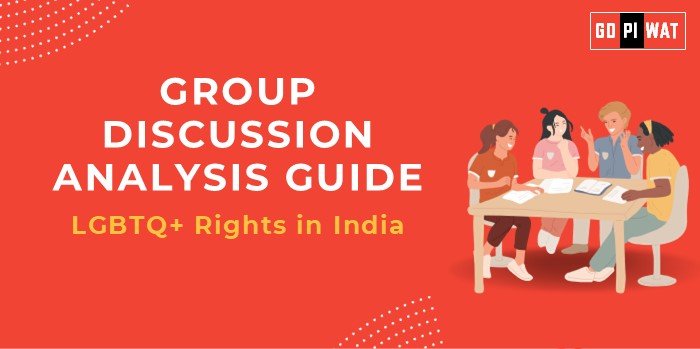📋 Group Discussion (GD) Analysis Guide on LGBTQ+ Rights in India
🌐 Introduction to LGBTQ+ Rights in India
Opening Context: LGBTQ+ rights in India have evolved significantly, particularly in recent years with landmark legal reforms, highlighting social progress and ongoing challenges. The discussion of LGBTQ+ rights has gained prominence in society, making it an essential topic for future leaders and B-school students.
Topic Background: Historically, India had laws that criminalized homosexuality, rooted in colonial legislation. This began to change with the 2018 Supreme Court decision in Navtej Singh Johar v. Union of India, which decriminalized same-sex relations, marking a pivotal shift in Indian jurisprudence and social rights.
📊 Quick Facts and Key Statistics
- ⚖️ Decriminalization of Homosexuality: 2018 – Supreme Court ruling removed Section 377, a colonial-era law criminalizing same-sex relations.
- 🏳️⚧️ Transgender Protection Law: 2019 – The Transgender Persons (Protection of Rights) Act, aiming to safeguard the rights of transgender individuals in India.
- 👨👩👦 Adoption Rights: 2023 – LGBTQ+ individuals are permitted to adopt in India, though adoption by LGBTQ+ couples remains restricted.
- 📊 Social Acceptance: According to a 2023 Ipsos survey, 56% of Indians now support LGBTQ+ rights, indicating a gradual shift in public opinion.
- 🏳️🌈 Pride Parades and Social Movements: Over 30 Indian cities now host pride parades annually, demonstrating increased social visibility and solidarity.
👥 Stakeholders and Their Roles
- 🏛️ Government Bodies: Enact and amend laws to protect LGBTQ+ rights and ensure anti-discrimination policies.
- 🤝 Non-Governmental Organizations (NGOs): Advocate for legal reforms, provide counseling, and support awareness initiatives on LGBTQ+ issues.
- ⚖️ Judiciary: Key driver in recognizing LGBTQ+ rights, including decriminalization and protection against discrimination.
- 🏢 Corporate Sector: Increasingly inclusive, with several companies establishing policies that support LGBTQ+ employees.
- 👥 Society at Large: Plays a crucial role in fostering acceptance and challenging stigma through social, educational, and cultural shifts.
🎯 Achievements and Challenges
🏆 Achievements:
- ⚖️ Legal Decriminalization: The 2018 Supreme Court ruling was a landmark in recognizing LGBTQ+ rights.
- 🏳️⚧️ Transgender Protections: The 2019 Act addresses issues like self-identification and anti-discrimination protections.
- 📺 Increased Visibility and Representation: Media, cinema, and educational platforms have contributed to a more positive portrayal of LGBTQ+ individuals.
- 🏢 Corporate Inclusion: Multinational and Indian companies are adopting LGBTQ+ inclusive policies.
⚠️ Challenges:
- 👩❤️👩 Marriage Equality: India does not yet legally recognize same-sex marriages, which restricts LGBTQ+ couples from various rights.
- 💼 Workplace Discrimination: Despite legal protections, social prejudice in workplaces remains a barrier.
- 🛑 Social Stigma and Violence: Many LGBTQ+ individuals still face discrimination, social ostracization, and violence, particularly in rural areas.
Global Comparisons: Countries like the Netherlands and Canada legally recognize same-sex marriages and ensure comprehensive LGBTQ+ rights, whereas India is still navigating the complex process of legal and social reforms.
🗣️ Structured Arguments for Discussion
✅ Supporting Stance:
“Decriminalizing same-sex relations in 2018 was a progressive leap, promoting human rights and equality.”
❌ Opposing Stance:
“While legal reforms exist, societal acceptance is lacking, with ongoing prejudice and limited marriage rights for LGBTQ+ individuals.”
⚖️ Balanced Perspective:
“India has made significant progress in LGBTQ+ rights, yet full equality in areas like marriage and adoption remains to be achieved.”
💡 Effective Discussion Approaches
🔑 Opening Approaches:
- 📊 Data-Driven Introduction: “With 56% of Indians supporting LGBTQ+ rights, public sentiment is shifting, though legal gaps remain.”
- ⚖️ Legal Milestone Approach: “The 2018 Supreme Court judgment on Section 377 marked India’s commitment to human rights.”
- 📜 Case Study Example: “Despite decriminalization, LGBTQ+ couples still face challenges in legal adoption, as seen in recent petitions for marriage equality.”
⚡ Counter-Argument Handling:
- Emphasize the difference between legal advancements and social acceptance.
- Cite ongoing challenges in rural areas and institutional discrimination.
🔎 Strategic Analysis of Strengths and Weaknesses (SWOT)
- 💪 Strengths: Legal progress, corporate inclusion, growing public support.
- ⚡ Weaknesses: Lack of marriage and adoption rights, social prejudice.
- 🌟 Opportunities: Increased corporate engagement, social campaigns for acceptance, international partnerships.
- ⚠️ Threats: Institutional discrimination, violence against LGBTQ+ individuals, limited awareness.
🏫 Connecting with B-School Applications
📖 Real-World Applications:
Addressing LGBTQ+ issues in corporate policies, fostering inclusive business environments, and considering the societal implications in marketing strategies.
📋 Sample Interview Questions:
- “What steps should businesses take to ensure LGBTQ+ inclusivity in India?”
- “How does the LGBTQ+ rights movement reflect on India’s social progress?”
- “Can legal reforms alone change public perceptions on LGBTQ+ issues?”
Insights for B-School Students: Understanding diversity, equality, and inclusion (DEI) is crucial for future leaders in crafting inclusive policies and navigating complex social dynamics in business.


